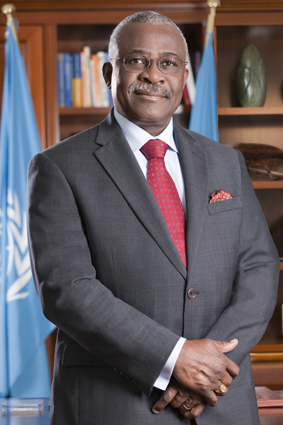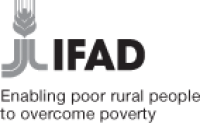Who will feed the 7 billionth person? IFAD President says smallholder farmers can, with increased investment in rural areas.
Who will feed the 7 billionth person?
IFAD President says smallholder farmers can, with increased investment in rural areas
…
27 October 2011 31 October 2011 is being marked as the day on which the global population reaches 7 billion. But it won’t stop there; the human population is expected to top 9 billion by 2050. To meet the needs of increasing numbers of people, food production will have to grow by 70 per cent. How will we grow enough food to feed ourselves? There are around 500 million small farms in the world, providing up to 80 per cent of the food consumed in Asia and sub-Saharan Africa. Investment in agriculture must be increased so that these farmers can raise their productivity and improve their livelihoods, because inevitably we will rely on them to feed a large part of humanity
…
Rome, 27 October 2011
As the world anticipates the 7 billionth person,Kanayo F. Nwanze, President of the International Fund for Agricultural Development (IFAD) raises the critical question of who will feed the rapidly expanding number of people on the planet.
“Whether you are number 7 billion or number 7 billion and one, all of us, in this generation and the next, must have enough safe, nutritious and affordable food,” Nwanze said. “As the population grows exponentially, we must support smallholder farmers so that they can feed themselves and contribute to the world’s food supply. And, at the same time, ensure that those who need to buy food have the income to do so.”
Next week, the United Nations Population Fund (UNFPA), marks the population milestone of 7 billion people.
“Having more mouths to feed is certainly a challenge at a time when already one billion children, women and men are chronically hungry. But it also presents an opportunity to increase the productivity and income of smallholder farmers, those already producing up to 80 per cent of the food consumed locally in developing countries,” Nwanze added.
Fifty years ago, the population was half of what it is now. According to the United Nations Population Division, the world population is expected to increase to 8 billion by 2025 and by 2050, it will be 9.3 billion. Food availability must go up by 70 per cent over the next 40 years if it is to keep pace with the expected demand.
The challenge, Nwanze said, is to make food production less insecure and more profitable for the majority of the world’s poorest people – smallholders and family farmers in developing countries.
“Improve their ability to feed themselves and you also improve their ability to feed others,” he said. “Improve their ability to generate income and you create new consumers and stronger economies.”
Specifically, it will be critical to improve cereal yields and to integrate smallholder farmers into high-value national, regional and international markets. Governments, development agencies and the producers themselves have key roles to play in the transformation of agriculture into a thriving sector.
But, Nwanze added, future food security also depends on whether rural areas create opportunities for young people. Currently, in some sub-Saharan African countries, more than 60 per cent of the population is under 25 years old and in India more than 70 per cent is under the age of 35. Agriculture must be a viable and attractive option, and young entrepreneurs should be provided with finance and other resources so that they can grow small businesses and build vibrant rural communities, he said.
”We must ensure that rural girls, as well as boys, are educated and receive training, so that they can be the community leaders, the entrepreneurs and the productive farmers of tomorrow,” Nwanze added. “It is one of the most effective strategies for reducing poverty and malnutrition.”
###
IFAD’s President: Kanayo F. Nwanze

Kanayo F. Nwanze began his term as IFAD’s fifth President on 1 April 2009. A Nigerian national, Nwanze has a strong record as an advocate and leader of change and a keen understanding of the complexity of development issues.
He brings to the job over 30 years of experience across three continents in poverty reduction through agriculture, rural development and research.
Under Nwanze’s leadership, IFAD has stepped up its advocacy efforts to ensure that agriculture is a central part of the international development agenda, and that the concerns and needs of smallholders and other poor rural people are recognized by governments around the world. In recognition of Nwanze’s intellectual leadership on issues of food security, he was asked to chair the World Economic Forum’s Global Agenda Council on Food Security in 2010.
During Nwanze’s tenure, IFAD has increased the number of outposted country programme managers and expanded the number of country offices. This increased country presence, and the direct supervision by IFAD of its projects, will help make them more effective.
Nwanze served as IFAD’s Vice-President for two years before taking the organization’s helm. Prior to that, he was Director-General of the Africa Rice Center for a decade. Nwanze was instrumental in introducing and promoting New Rice for Africa (NERICA), a high-yield, drought- and pest-resistant rice variety developed specifically for the African landscape. He also transformed the Center from a West African association to an Africa-wide organization with an international reputation for excellence.
In addition, Nwanze has held senior positions at a number of research centres affiliated with the Consultative Group on International Agricultural Research (CGIAR) in Africa and Asia, and he was instrumental in the establishment of the Alliance of CGIAR Centers.
Nwanze earned a Bachelor of Science degree in Agricultural Science from the University of Ibadan, Nigeria, in 1971, and a Doctorate in Agricultural Entomology from Kansas State University, United States, in 1975.
He has published extensively, is a member of several scientific associations and has served on the executive boards of various institutions.
Nwanze has received numerous honours and awards from governments and international institutions, including Commander of the National Order of Merit of Côte d’Ivoire and Officer of the National Order of Benin.
###

The International Fund for Agricultural Development (IFAD), a specialized agency of the United Nations, was established as an international financial institution in 1977 as one of the major outcomes of the 1974 World Food Conference. The Conference was organized in response to the food crises of the early 1970s that primarily affected the Sahelian countries of Africa. The conference resolved that “an International Fund for Agricultural Development should be established immediately to finance agricultural development projects primarily for food production in the developing countries”. One of the most important insights emerging from the conference was that the causes of food insecurity and famine were not so much failures in food production, but structural problems relating to poverty and to the fact that the majority of the developing world’s poor populations were concentrated in rural areas.
IFAD is dedicated to eradicating rural poverty in developing countries. Seventy-five per cent of the world’s poorest people – 1.4 billion women, children and men – live in rural areas and depend on agriculture and related activities for their livelihoods.
Working with rural poor people, governments, donors, non-governmental organizations and many other partners, IFAD focuses on country-specific solutions, which can involve increasing rural poor peoples’ access to financial services, markets, technology, land and other natural resources.
IFAD’s mission is to enable poor rural people to overcome poverty.
* Official website: http://www.ifad.org/
###
> United Nations (UN).
 The United Nations was established on 24 October 1945 by 51 countries committed to preserving peace through international cooperation and collective security. Today, nearly every nation in the world belongs to the UN: membership totals 192 countries.
The United Nations was established on 24 October 1945 by 51 countries committed to preserving peace through international cooperation and collective security. Today, nearly every nation in the world belongs to the UN: membership totals 192 countries.
When States become Members of the United Nations, they agree to accept the obligations of the UN Charter, an international treaty that sets out basic principles of international relations. According to the Charter, the UN has four purposes:
- to maintain international peace and security;
- to develop friendly relations among nations;
- to cooperate in solving international problems and in promoting respect for human rights;
- and to be a centre for harmonizing the actions of nations.
### * The above story is adapted from materials provided by United Nations (UN) ** More information at United Nations (UN)



















